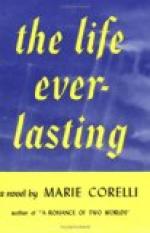Mr. Harland did not answer, but turning round, addressed me.
“You enjoyed yourself at Loch Coruisk, didn’t you?”
“Indeed I did!” I replied, with emphasis—“It was a lovely scene!— never to be forgotten,”
“You and Mr. Santoris would be sure to get on well together,” said Catherine, rather crossly—“‘Birds of a feather,’ you know!”
I smiled. I was too much taken up with my own thoughts to pay attention to her evident ill-humour. I was aware that Dr. Brayle watched me furtively, and with a suspicious air, and there was a curious feeling of constraint in the atmosphere that made me feel I had somehow displeased my hostess, but the matter seemed to me too trifling to consider, and as soon as the conversation became general I took the opportunity to slip away and get down to my cabin, where I locked the door and gave myself up to the freedom of my own meditations. They were at first bewildered and chaotic—but gradually my mind smoothed itself out like the sea I had looked upon in my vision,—and I began to arrange and connect the various incidents of my strange experience in a more or less coherent form. According to psychic consciousness I knew what they all meant,—but according to merely material and earthly reasoning they were utterly incomprehensible. If I listened to the explanation offered by my inner self, it was this:—That Rafel Santoris and I had known each other for ages,—longer than we were permitted to remember,—that the brain-pictures, or rather soul-pictures, presented to me were only a few selected out of thousands which equally concerned us, and which were stored up among eternal records,—and that these few were only recalled to remind me of circumstances which I might erroneously think were all entirely forgotten. If, on the other hand, I preferred to accept what would be called a reasonable and practical solution of the enigma, I would say:—That, being imaginative and sensitive, I had been easily hypnotised by a stronger will than my own, and that for his amusement, or because he had seen in me the possibility of a ‘test case,’ Santoris had tried his power upon me and forced me to see whatever he chose to conjure up in order to bewilder and perplex me. But if this were so, what could be his object? If I were indeed an utter stranger to him, why should he take this trouble? I found myself harassed by anxiety and dragged between two opposing influences—one which impelled me to yield myself to the deep sense of exquisite happiness, peace and consolation that swept over my spirit like the touch of a veritable benediction from heaven,—the other which pushed me back against a hard wall of impregnable fact and bade me suspect my dawning joy as though it were a foe.




